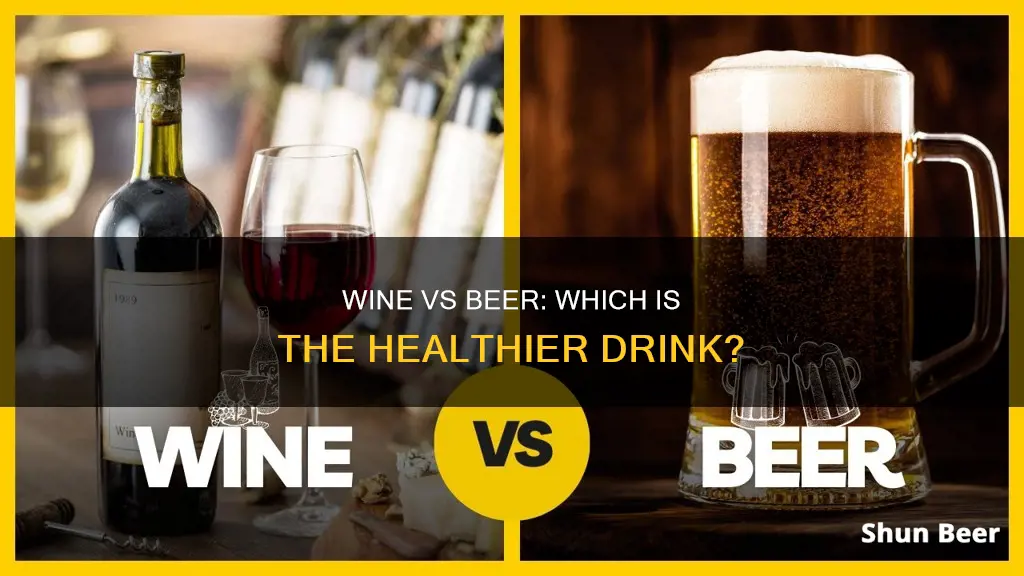
Wine or beer? It's a question that has plagued drinkers for centuries. While both drinks have their pros and cons, and the answer ultimately comes down to personal preference, there are some key differences to consider when it comes to health, taste, and social situations.
On the one hand, wine, especially red wine, has long been touted as the healthier option due to its antioxidant levels and potential heart-health benefits. On the other hand, beer contains B vitamins, folate, and protein, giving it more nutritional value than wine.
When it comes to calories, wine generally has fewer calories per serving, but the type of beer or wine can significantly impact the calorie count. For example, a standard glass of red wine typically contains around 120-125 calories, while a craft beer can pack over 200 calories per bottle.
In terms of taste, wine is often considered more sophisticated and versatile, pairing well with a variety of foods and social situations. Beer, on the other hand, might be preferred in more casual settings and is often seen as more refreshing.
Ultimately, the best drink is subjective, and both wine and beer can be enjoyed in moderation as part of a balanced lifestyle.
| Characteristics | Values |
|---|---|
| Calories | Beer has 50% more calories than wine. |
| Nutritional value | Beer has more nutritional value than wine, including protein, fiber, B vitamins, folate, and niacin. |
| Weight gain | Studies suggest that moderate drinkers of both wine and beer are not likely to gain weight over time. |
| Health benefits | Wine, especially red wine, has been associated with improved heart health, reduced risk of diabetes, and anti-ageing properties. Beer also has health benefits, including improved bone health and reduced risk of heart disease and diabetes. |
| Hangovers | Both drinks can lead to hangovers if consumed in excess. |
| Price | Beer is generally cheaper than wine. |
| Pairing with food | Wine is considered to pair better with food, especially cheese. |

Calories and nutrition
When it comes to calories and nutrition, wine and beer have some notable differences. While both drinks contain calories, the specific amount can vary depending on the type of wine or beer. Typically, a standard 5-ounce glass of red wine contains around 120-125 calories, while a 5-ounce serving of white wine has slightly fewer calories, ranging from 99 to 123 calories. On the other hand, beer calorie counts can vary significantly. Low-carb beers start at around 95 calories per bottle, while a light lager might contain 145 calories in a 12-ounce serving. Craft beers and heavier types, such as IPAs, can pack 200 calories or more in a pint. Therefore, if you're concerned about calorie intake, wine may be a better choice, especially if you opt for lower-calorie options like prosecco or non-alcoholic varieties.
In terms of nutritional value, beer has an edge over wine. Beer contains protein, fiber, B vitamins, folate, and niacin, making it more nutritionally comparable to food. Beer also contains polyphenols, specifically quercetin, epicatechins, and gallic acid, which are linked to potential health benefits. However, it's important to note that the amount of polyphenols in alcohol is modest compared to the amount found in plant foods like tea, coffee, berries, onions, or apples.
Wine, especially red wine, also contains polyphenols, including flavonoids and resveratrol. These compounds are believed to provide various health benefits, such as improved heart health, reduced risk of diabetes, and potential anti-ageing effects. White wine, however, has a lower polyphenol content than red wine. Additionally, white wine is more acidic, which can have a negative impact on tooth enamel.
While both wine and beer provide some nutritional benefits, it's important to remember that excessive consumption of alcohol can lead to negative health consequences, including hangovers, dependency, and liver damage. Therefore, moderation is key, and it's always advisable to prioritise a healthy diet and lifestyle over any potential benefits from alcoholic beverages.
Jewish Drinking Customs: Beer Included or Forbidden?
You may want to see also

Health benefits
Wine and beer both have their own unique health benefits, but it's important to remember that excessive consumption of alcohol can lead to negative health outcomes. Here are some of the key health benefits of wine and beer:
Wine:
- Heart Health: Wine, especially red wine, has long been associated with improved heart health. Studies suggest that red wine may contain compounds that relax blood vessel walls and prevent the oxidation of "bad" cholesterol, reducing the risk of cholesterol-filled plaque buildup.
- Antioxidants: Red wine contains antioxidants like resveratrol, which has been linked to various health benefits, including reduced heart disease risk and potential anti-ageing effects.
- Flavonoids: Wine contains flavonoids, which may offer protection against harmful UV rays for the skin.
- Blood Sugar Control: Some studies suggest that red wine, when consumed with meals, may help lower the risk of type 2 diabetes.
- Longevity: The combination of antioxidants and other compounds in red wine is believed to contribute to improved longevity.
Beer:
- Nutrition: Beer has higher nutritional value than wine, containing protein, fiber, B vitamins, folate, and niacin.
- Bone Health: Studies suggest that the hops in beer may increase bone mineral density, leading to stronger bones.
- Cholesterol: Moderate beer consumption has been linked to positive effects on HDL ("good") cholesterol and improved blood vessel health.
- Vitamins and Minerals: Beer contains vitamins and minerals such as niacin, vitamin B6, and folate, which are not present in significant amounts in wine.
- Fiber: Beer, especially darker varieties like stouts and porters, can provide more fiber than wine.
While both wine and beer offer certain health benefits, it's important to consume them in moderation as part of a balanced lifestyle. Excessive alcohol consumption can lead to negative health outcomes, including liver damage, weight gain, and an increased risk of cardiovascular disease and certain types of cancer.
Drinking Beer in Public: Vietnam's Laws and Culture
You may want to see also

Hangovers
A study by Dr. Kai Hensel and colleagues at the University of Cambridge set out to test the common saying, "beer before wine and you'll feel fine". They found that, contrary to popular belief, the order in which one consumes beer and wine does not impact the severity of a hangover. The best predictors of a bad hangover were how drunk the subjects felt and whether they vomited after drinking.
However, there are certain factors that can increase your chances of having a bad hangover. Drinking on an empty stomach and not staying hydrated are two of the main culprits. The type of alcohol consumed can also play a role, with darker drinks like red wine containing higher concentrations of congeners, which are chemical byproducts of the fermentation process. Congeners are believed to contribute to more intense hangovers, possibly due to the extra time needed for the body to break them down along with ethanol. Sulfites, which are added to wine as preservatives, can also cause headaches, especially for those with asthma or sulfite sensitivities.
To reduce the chances of a severe hangover, it is recommended to drink lighter-coloured alcoholic beverages like white wine, vodka, gin, or light beer, as these have fewer congeners. Staying hydrated and eating a nutritious meal before drinking can also help, as can choosing lower-alcohol wines. Ultimately, the best way to prevent a hangover is to drink in moderation or avoid alcohol altogether.
Beer and the Gym: Is It a Good Mix?
You may want to see also

Social situations
Drinking alcohol is a huge part of socialising and is often used as a way to relax and celebrate special occasions. However, it is important to note that excessive alcohol consumption can lead to addiction and alcoholism.
Navigating Social Situations Without Drinking
If you are a non-drinker, it can be challenging to navigate social situations where alcohol is present. Here are some tips to help you feel more comfortable:
- Remember that you are not alone. There are many people who choose not to drink for various reasons, such as religious beliefs, health concerns, or personal preferences.
- It gets easier with time. As people age, they may drink less due to changing priorities or health conditions.
- Find a reliable non-alcoholic drink that you can order, such as sparkling water or mocktails. This can help you blend in and avoid unwanted attention.
- Keep a drink in hand, even if it is non-alcoholic. This can help you avoid conversations about drinking and allow you to participate in toasts.
- Be confident and firm in your decision not to drink. You don't need to explain your reasons to others, and most people will respect your choice.
- Offer non-alcoholic options at your gatherings. This can include mocktails, sparkling water, or other beverages.
- Be mindful of cultural differences. In some cultures, drinking alcohol may be considered offensive or unacceptable. Respect the norms and traditions of the culture you are in.
Choosing Between Wine and Beer in Social Situations
When it comes to choosing between wine and beer in social situations, consider the following:
- Wine and beer have different effects on mood and emotions. Research suggests that wine and beer are associated with more positive responses, while spirits are linked to increased aggression and negative moods.
- Wine is generally considered healthier than beer. It has lower calorie content and can offer some health benefits when consumed in moderation, such as improved cardiovascular health and slower ageing.
- Wine is more photogenic and socially acceptable in certain situations. For example, wine is often preferred for toasts, gifts, and formal occasions.
- Wine gets better with age, while beer tends to go off over time. Aged wines can develop a smoother and more sophisticated taste profile.
- Wine and cheese are a classic pairing, while beer may not complement cheese as well due to its carbonation and bitterness.
Ladies and Beer: Is It a Good Mix?
You may want to see also

Flavour and taste
When it comes to flavour and taste, wine and beer are vastly different. Wine is made from crushed grapes, while most beers are brewed from grains like malted barley. Wine is also more varied in its flavour profile, with red, white, rosé, sparkling, and dessert wines, each with distinct tastes.
Red wines get their distinct colour and taste from flavonoids, a type of polyphenol. Flavonoids are also found in other plant foods like blueberries, strawberries, and dark chocolate. Red wines contain about ten times more polyphenols than white wines, which is why they are often touted as healthier. However, white wines may have other active compounds that provide health benefits.
Beer, on the other hand, gets its flavour from hops, the flowers of the hop plant. Hops have been approved by Germany's Commission E, the German equivalent of the FDA, for treating restlessness, anxiety, and sleep disturbances. Beer also contains vitamins and minerals like niacin, vitamin B6, and folate, which are not present in significant amounts in wine. Darker beers, like stouts and porters, also contain more fibre.
In terms of calories, beer typically has more calories than wine. A pint of lager has around 50% more calories than a medium-sized glass of wine. However, the calorie count can vary depending on the type of beer, with low-carb beers starting at around 95 calories per bottle and craft beers containing 200 calories or more per pint. Wine also varies in calorie count depending on the type, with red wines typically having slightly more calories than white wines.
When it comes to taste, wine is often considered more elegant and refined, with a wider range of flavour profiles to suit different palates and occasions. Beer, on the other hand, is often associated with a more casual, laid-back drinking experience. Ultimately, the choice between wine and beer depends on personal preference, as both have their unique flavour and taste characteristics that cater to different tastes and occasions.
Gluten-Free Beer: Safe Drinking Options for Celiacs
You may want to see also
Frequently asked questions
It depends on your preferences and what you're looking for. Both drinks have their pros and cons, but it's important to remember that excessive alcohol consumption can lead to negative health effects and dependency.
Wine, especially red wine, contains antioxidants and compounds like polyphenols, flavonoids, and tannins, which may provide health benefits such as improved heart health, lower diabetes risk, and protection against certain diseases. Wine also tends to have fewer calories than beer and is lower in carbs, making it a better option for keto and similar diets.
Beer contains vitamins, minerals, protein, fiber, and other nutrients that wine lacks. It also tends to be cheaper than wine and has a slower intoxication effect compared to wine.
Yes, excessive consumption of either drink can lead to negative health effects, including hangovers, dependency, liver damage, and increased risk of various diseases. Additionally, white wine is acidic and can affect tooth enamel, while red wine may trigger migraines in some individuals.







